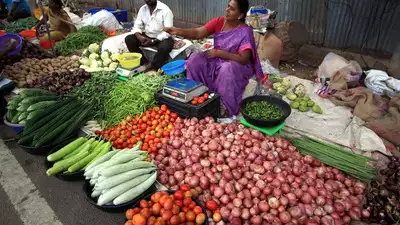The Government of India is on high alert and taking steps, due to a significant rise in the prices of onions, other food products, and essential consumables that affect the common man. This sharp increase has caused widespread concern, leading the government to take immediate steps to stabilize the market. One of the key measures being considered is the importation of these commodities to boost supply and control prices.
Onions are a staple in Indian cuisine, and their price often serves as an indicator of food inflation. Recently, onion prices have surged dramatically due to several factors. Poor weather conditions, including unseasonal rains, have disrupted harvests and supply chains. Additionally, storage and distribution challenges have compounded the problem, leading to reduced availability in the markets.
This price rise is not limited to onions. Other essential food products such as tomatoes, potatoes, and pulses have also seen significant price increases. These hikes are impacting the daily lives of millions of Indians, especially those in lower-income brackets who spend a substantial portion of their income on food.
The government is keenly aware of the distress caused by these rising prices. Official sources indicate that multiple measures are being implemented to mitigate the situation. One of the immediate steps is the import of onions and other critical food items. By increasing the supply through imports, the government aims to reduce prices and make these essential commodities more affordable.
The plan to import onions and other food products is already in motion. The government is coordinating with various countries to secure these imports. Efforts are being made to ensure that the imported goods are of high quality and meet safety standards. This move is expected to bring down prices in the short term and provide relief to consumers.
In addition to importing, the government is also exploring ways to improve domestic production. This includes providing support to farmers, enhancing storage facilities, and improving logistics to ensure a steady supply of food products throughout the year. Long-term measures are also being considered to make the agricultural sector more resilient to weather changes and market fluctuations.
To ensure that the benefits of these measures reach the common man, the government is also stepping up monitoring and enforcement. Authorities are closely watching market trends and taking action against hoarders and black marketers who exploit the situation for profit. Strict penalties are being imposed on those found guilty of such practices to prevent artificial inflation of prices.
The rising prices of onions and other food products have a direct impact on the daily lives of people. For many families, especially those living below the poverty line, these price hikes mean having to cut back on essential items. The government’s efforts to import and stabilize prices are aimed at easing this burden. By making these commodities more affordable, the government hopes to ensure that every household can access nutritious food without financial strain.
While the immediate focus is on addressing the current crisis, the government is also looking at long-term solutions. This includes investing in agricultural infrastructure, promoting better farming practices, and encouraging research and development in the agricultural sector. By doing so, the government aims to create a more stable and self-sufficient food supply system.
The Government of India is taking proactive steps to address the sharp rise in prices of onions, other food products, and essential consumables. Through imports, better monitoring, and support for domestic production, the government aims to stabilize the market and provide relief to the common man. While these measures are expected to bring short-term relief, the focus on long-term solutions will help build a more resilient agricultural sector, ensuring food security for all.



Leave a Reply